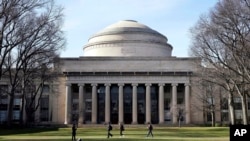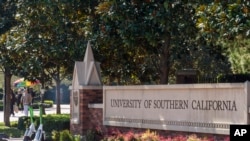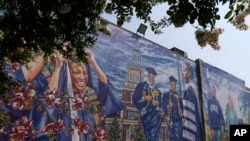Student Union
Students Drowning in 'Insane' Debt Delay Life Goals

Mentioning the words "student debt" to millennials and younger people is like dropping a match on a trail of gasoline.
"Our total debt for credit cards and student loans combined is almost $150,000," said Matt Porter, 31, who lives in Lowell, Massachusetts, with his fiancee. "It's absolutely insane and makes it really hard to move forward with life goals."
Porter and other millennials say being bogged down by massive student debt makes it difficult to buy a house or start a family.
The first in his family to attend college, Porter took out $80,000 in loans to attend Boston College in 2005, hoping to become a journalist. He worked five unpaid internships, finding housing and food at his own expense. After getting his bachelor's degree in 2009 and a master's in 2012, he struggled for four years in television news. He made $22,000 a year, working at least 60 hours per week.
In July 2016, he called it quits.
Porter switched to a roof over his head, a wedding, and relative financial stability when he landed a job developing multimedia content and working with the press at the JFK Library Foundation.
He and his fiancee recently bought a condo and are finally planning the wedding they had long hoped for.
"It's very challenging as a millennial to buy a home. I delayed a lot of milestones in my 20s, like getting married, buying a house, having kids, saving for retirement," Porter said. "I should have been saving, but I had the student loans."
American colleges and universities are significantly more expensive today than when earlier generations attended. Between 1980 and 2014, the average annual increase in college tuition grew by nearly 260 percent, according to the Bureau of Labor Statistics.
"There was a time when a small amount of savings and a part-time job could get students through college with little or no debt," wrote Mary Clare Anselem, policy analyst for the Heritage Foundation's Center for Education Policy. "But today, more students than ever are turning to federal loans to finance their college education."
Between 1990 and 2012, college enrollment increased 62 percent, according to the think tank's website. But the volume of borrowing for school increased 352 percent. By the end of 2017, according to the Federal Reserve Bank, national student loan debt in the United States was $1.48 trillion. By comparison, mortgage, or housing, debt was $13 trillion.
"This weighty increase in student loan debt presents problems for both students and taxpayers. A recent survey found that 56 percent of young people put off milestones such as getting married or buying a home because of student loan debt," Anselem wrote.
"Only in the last two years have I really made any dent in the principal of my student loans," lamented Porter.
Never ask a millennial "how much debt they're in," tweeted @bghsclarigirl from Las Vegas, Nevada.
Twitter user Kayla Muldoon, a student at Point Park University in Pittsburgh, took a tongue-in-cheek poke at the plight of student debt.
"Imagine the amount of homeowners if universities were free," posted Realtor Ben Clough on social media.
Theresa Maher and Taylor Crehan contributed to this report.
See all News Updates of the Day
Malaysian official: Schools can’t turn away from global tensions

Zambry Abdul Kadir, Malaysia’s higher education minister, said protests spreading across universities in the United States show that schools can’t ignore political tensions.
Helen Packer, reporting in Times Higher Education, said the minister reminded educators that universities are key in the development of leaders, individuals and societies. (April 2024)
Social media breaks are difficult, but necessary

Between online classes, maintaining social connections and working on projects, college students can have a hard time disengaging from the demands of technology.
In Florida International University’s PantherNOW, Ariana Rodriguez offers strategies for taking a break from social media. (April 2024)
- By Melos Ambaye
Many master's degrees aren't worth the investment, research shows
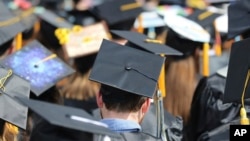
Nearly half of master's degrees have a negative financial return, according to new research by the Foundation for Research on Equal Opportunity, an economic research organization.
The study indicates that many graduate degree programs do not increase lifetime earnings enough to be worth it.
While 23% of bachelor’s degree programs yield a negative financial return on investment, 43% of two-year degrees and master’s degrees fail to deliver a return, according to the study by Preston Cooper, a senior fellow at FREOPP.
Cooper assessed the return on investment for 53,000 degree and certificate programs to determine whether a student’s lifetime earnings outweigh program costs and the risk of not completing their degree.
His findings show that a student’s field of study was the overriding indicator of return on investment at the undergraduate and graduate level.
Engineering, computer science and nursing bachelor’s degrees have high financial returns on investment, while programs in education, fine arts, psychology and English usually have low returns.
Graduate degrees in medicine and law tend to have strong payoffs. But a large share of master’s programs, including the MBA, frequently have low payoffs, according to Cooper.
Although workers with master’s degrees earn 16% more than those with only bachelor’s degrees, Cooper says the figure fails to account for students who had “higher preexisting earnings potential.”
“MBA students typically have high preexisting earnings potential, having often chosen high-ROI undergraduate majors such as finance and economics,” Cooper writes. “So the MBA adds little value on top of that.”
The study indicates that high starting salaries are predictors of high returns on investment. Degrees with starting salaries of $57,000 a year or more deliver the best lifetime returns.
But the return on investment of a degree can vary depending on the educational institution.
“Students interested in fields with low average pay can still find some schools that do well transforming those fields of study into high-paying careers,” Cooper writes.
The quality of an institution also matters, said William Tierney, professor emeritus of higher education at the University of Southern California.
“An MBA from Harvard is a likely ticket to a good job,” Tierney told VOA. “An MBA from the University of Phoenix, less so.”
But students pursue graduate programs for more than just financial reasons.
“Some degrees open up careers in fields that students may enjoy, such as in the performing arts,” Robert Kelchen, head of educational leadership at the University of Tennessee, Knoxville, told VOA.
“Others can help gain access to social networks or simply help students learn about a topic that is of interest,” Kelchen added.
Cooper told VOA that it might make sense for students in degree programs with low returns on investment to switch majors if they can still graduate on time.
He found the worst outcome for a student’s return on investment is dropping out of college “because they must pay for one or more years’ tuition and spend time out of the labor force.”
Lawmakers who fund higher education have a responsibility in ensuring “higher education delivers on its promise of economic mobility,” Cooper said.
Nearly a third of federal funding, including Pell grants and student loans, pays for higher education programs that fail to provide students with a return on investment, according to the study.
Cooper’s view is that “some schools should shut down low-ROI programs and reallocate institutional resources to programs with a better return.”
“There's definitely this narrative out there that higher education is always worth it, and you should always try to get that extra degree because it will increase your earnings,” he told VOA. “That's reinforced by colleges who make lofty promises regarding their graduate degree programs' outcomes, which all too often fall short.”
Harvard students end protest as school agrees to discuss Gaza conflict
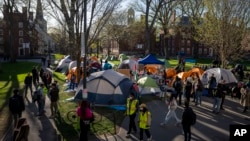
Protesters against the war between Israel and Hamas were voluntarily taking down their tents in Harvard Yard on Tuesday after university officials agreed to discuss their questions about the endowment, bringing a peaceful end to the kinds of demonstrations that were broken up by police on other campuses.
The student protest group Harvard Out of Occupied Palestine said in a statement that the encampment "outlasted its utility with respect to our demands." Meanwhile, Harvard University interim President Alan Garber agreed to pursue a meeting between protesters and university officials regarding the students' questions.
Students at many college campuses this spring set up similar encampments, calling for their schools to cut ties with Israel and businesses that support it.
The Israel-Hamas war began when Hamas and other militants stormed into southern Israel on October 7, killing some 1,200 people and taking 250 hostages. Palestinian militants still hold about 100 captives, and Israel's military has killed more than 35,000 people in Gaza, according to Gaza's Health Ministry, which doesn't distinguish between civilians and combatants.
Harvard said its president and the dean of the Faculty of Arts and Sciences, Hopi Hoekstra, will meet with the protesters to discuss the conflict in the Middle East.
The protesters said they worked out an agreement to meet with university officials, including the Harvard Management Company, which oversees the world's largest academic endowment, valued at about $50 billion.
The protesters' statement said the students will set an agenda that includes discussions on disclosure, divestment, reinvestment and the creation of a Center for Palestine Studies. The students also said that Harvard has offered to retract suspensions of more than 20 students and student workers and back down on disciplinary measures faced by 60 more.
"Since its establishment three weeks ago, the encampment has both broadened and deepened Palestine solidarity organizing on campus," a spokesperson for the protesters said. "It has moved the needle on disclosure and divestment at Harvard."
Chinese students report interrogations, deportations at US airports
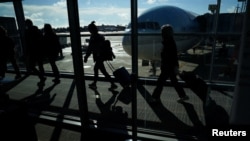
Academics from China are reporting increased scrutiny at U.S. airports, with valid visa holders being interrogated and turned away by Customs and Border Protection Agents.
Phones and laptops have been searched, and researchers have undergone extensive questioning about their work. One graduate student at Yale, who was midway through her PhD, was turned back at Dulles airport and banned from entering the U.S. for five years, according to The Guardian.




